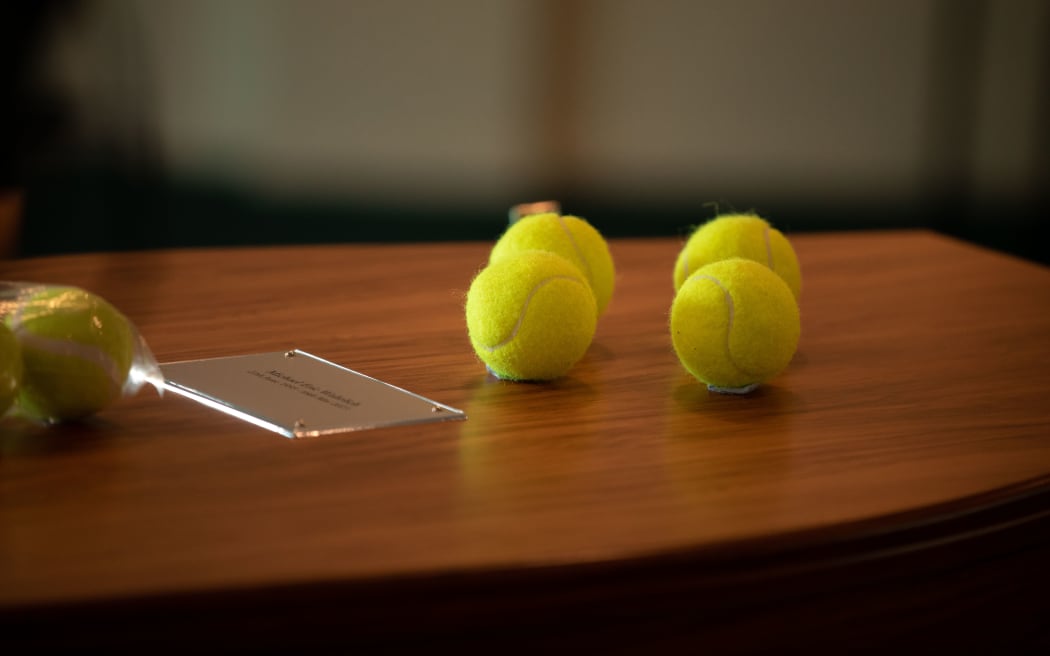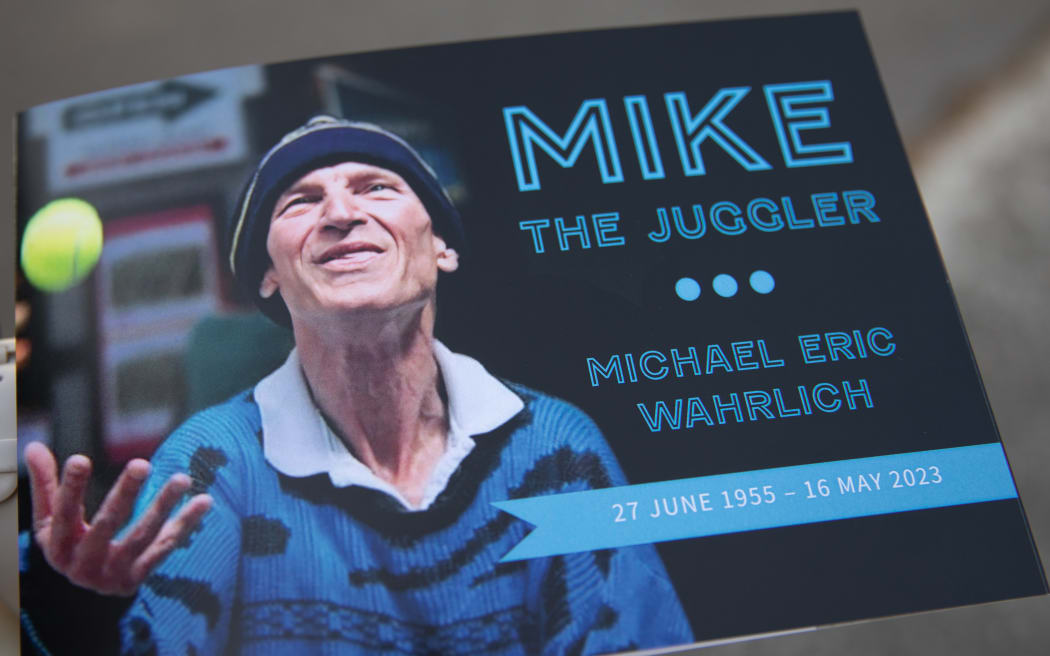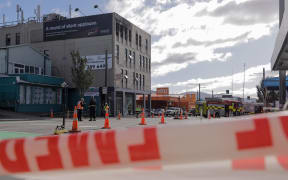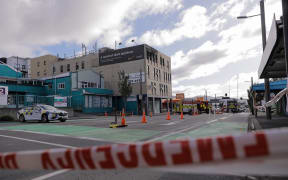
Tennis balls on the casket at Mike 'the juggler' Wahrlich's funeral in Wellington. Photo: RNZ / Samuel Rillstone
By David Cohen*
Opinion - The death of Mike 'the juggler' Wahrlich in last week's fire in Wellington prompts David Cohen to examine Mike's past and how that one particular activity became such a source of self-esteem in his life.
'Mike the Juggler' loved throwing balls in the air, always green tennis balls they were, three or four of them tumbling in the Wellington air. Any time of the day and sometimes into the night on the streets of the capital he'd be at it, usually on Lambton Quay but sometimes in other places as well.
Tens of thousands of passersby saw him hard at it over the decades. Even as some must have wondered who this little guy in the signature blue jumper and baggy pants actually was in real life. And how did it happen that this one particular activity ever became such a focus and source of self-esteem in his life?
This past week, tragically, the answer to the first question became widely known when the 67-year-old Mike Wahrlich was named among those who perished in the blaze that ripped through the Loafers Lodge hostel in Wellington.
Answering the other question, however, necessitates a bit of a circuitous trip through the alleys of local social history. It's a journey that loops back to the lengthiest and costliest inquiry ever held in New Zealand.
Over the past four years, the Abuse in Care Royal Commission of Inquiry has sometimes struggled to put a human face to the question of what happened to the wards who passed through the various residences for the young that operated around the country in the last half of the 20th century.
The commissioners have considered 450,000 evidential documents, held 133 days of public hearings and consulted heaven knows how many experts and activists, some of them with rather weighty ideological barrows to push.
The process has certainly been challenging.
Few observers would have been surprised to recently learn that the government has yet again extended the commission's deadline for its final report. The report had been supposed to be sent to Parliament next week but will instead be presented in March 2024.
What did Mike Wahrlich make of all of this? Who knows. Perhaps a more apposite question to ask might be what people made of Mr Wahrlich. He was, after all, an elusive face the inquiry has spent much effort and treasury trying to bring into public focus.

A memorial card for Mike. Photo: RNZ / Samuel Rillstone
I first became aware of Mr Wahrlich's connection with the subject a decade ago when I started gathering notes for Little Criminals, my book about Epuni Boys' Home, arguably the most notorious of the country's two-dozen state-run institutions for the young. Hard-luck stories from the grim residence have disproportionately figured in the many testimonies the commission has gathered.
Surprisingly, perhaps, it has to be said that Epuni did not always lack for redeeming features. This was particularly the case in the 1960s when it served - or at least tried to serve - as a decent second option for boys unable to cope or be contained in their own home environments.
Mr Wahrlich intersected with the residence during those palmier times, back when Epuni was still officially referred to simply as the Boys' Home, Lower Hutt, and when most of those who administered the joint could fairly be described as progressive sorts. It was the period before the place spiralled into managerial chaos and even outright criminality. Epuni at the time still reflected some of the liberal values many of its staff had when the residence on Riverside Drive first opened in the summer of 1959.
One gets a sense of these benign intentions by studying, for example, the almost unfailingly cheerful commentary scribbled in the institution's early logbooks.
"Boys excited but settled reasonably well," notes one. "Supper and lights out at 9.30pm." More of the same followed the next day, and the next day as well, and indeed for the better part of a decade.
Elsewhere in the records, kids are referred to by their first names, and the talk is of movie outings, trips to the local baths and softball games, a sweet and light record of that dovetails nicely with the recollections of others of the institution's initially relaxed environment.
But Epuni, which was initially overseen by the old Department of Education, was also meant to produce scholastic results as well. More often than not this was a problem.
According to an early departmental study, the average resident was "academically retarded" by up to seven years in terms of basic literacy and mathematical skills. Leaving aside the unfortunate choice of words there's no reason to doubt the assessment, not to mention the headache it must have created for managers looking to somehow fill the intellectual void, let alone the long, dreary days for up to 42 restless boys at any given time.
Sure, the wards could have been enrolled in a "special" class at one or other of the schools around the Hutt Valley. But the schools weren't always enthusiastic. There was also the perennial issue of classmates or even teachers labelling these entrants as "handicapped", which itself could cause volcanic issues to sort out after hours.
Much better, it was reasoned, to create adjacent activities at the boys' home - outside of the educationally desultory classroom the institution did maintain - that they might eventually prosper in.
So the boys stayed "home" for the most part, learning, for example, how to play the guitar. There was weaving, too, rather more so in the later years when Māori youngsters began to disproportionately figure in the cohort. Some wards even learnt to carve pumice.
And what about those whose talents didn't find a match with any of the above? Well, there was always juggling.
And why not? Juggling improves hand-eye coordination and bi-manual dexterity. Juggling focuses concentration and reduces stress. It fine-tunes goal-setting and problem solving skills.
On top of that, juggling delays gratification and in doing so enhances self-esteem. Indeed, these days it is widely seen as a therapeutic tool for treating youngsters with ADHD.
No doubt it accrued these and other benefits for at least one boy of the time. It's easy to imagine what this meant to Mike the Juggler.
What isn't so easy to imagine is the closing months of his life.
First there was the savage beating he received at Loafers Lodge that left him in hospital for a month in 2022. Later, fitfully, awkwardly, a shadow of his already broken former self, back out on to the streets again, hoping to recapture the old juggler's style.
Perhaps he hoped for an apology, too, and perhaps a share in the redress to which would have been entitled on the back of the royal commission's long-postponed report.
Alas, the ultimate content of that document still hangs in the air like so many tennis balls aloft in the Wellington night, while so much else continues to burn.
* David Cohen is a Wellington journalist and the author of Little Criminals: The Story of a New Zealand Boys' Home. He supplies regular analyses of the Abuse in Care inquiry for RNZ.




